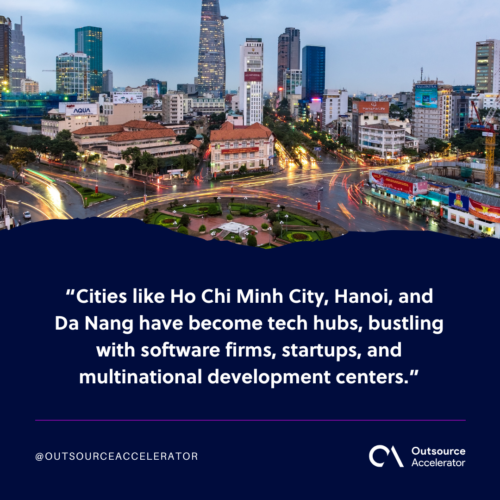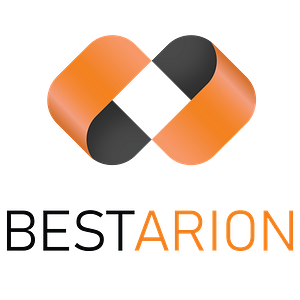Vietnam’s advantage: Driving business growth through offshore software development

Alright, let’s talk about Vietnam. It’s not just that place with the delicious pho anymore; it’s becoming a real powerhouse for businesses looking to get top-notch software built without breaking the bank.
With so many options in software companies, finding the right tech talent can feel like searching for a needle in a haystack, and that’s where smart outsourcing comes in.
In the 535th episode of the Outsource Accelerator Podcast, Hung “Vano” Nguyen, CEO of Vietnam-based software company Bestarion, highlights his country’s strength in this field.
Why are more and more companies setting their sights on Vietnam for their software needs? Let’s dive into the advantages this vibrant country offers.
Outsourcing to Vietnam
Over the past decade, Vietnam has steadily carved out a niche for itself in the global IT outsourcing industry. The country ranks among the top outsourcing destinations in Asia, competing with the likes of India and the Philippines.
Cities like Ho Chi Minh City, Hanoi, and Da Nang have become tech hubs, bustling with software firms, startups, and multinational development centers.

Vano is aware that Vietnam doesn’t immediately rank high when thinking about spots for offshore software development. However, his company, Bestarion, has thrived in providing software solutions to loyal clients.
“We handle all the software development and production operations [for] more than 1000 healthcare facilities in the US.”
He’s still very confident about the nation’s capability.
“There are now quite a lot of outsourcing companies in Vietnam, and there has been a growing need for IT staff [to join] companies.”
Benefits of offshore software development in Vietnam
Choosing Vietnam as an offshore software development destination offers a myriad of advantages that can propel businesses toward success:
1. Cost-effectiveness without compromising quality
This is often the first thing that catches a business owner’s eye. Vietnam offers significantly lower labor costs compared to many Western countries and even some other outsourcing hubs.
However, this isn’t about sacrificing quality for a lower price tag. The Vietnamese IT workforce is highly educated, with a strong emphasis on technical training in universities and vocational schools.
You’re getting skilled offshore software developers who can deliver complex projects without the premium costs associated with talent in more expensive regions.
This allows businesses to allocate their resources more strategically, reinvesting savings into other crucial areas like marketing or product innovation.
2. A deep and growing talent pool
In Vietnam, there is a rising number of young IT professionals who are rapidly expanding their skills. The number of graduates in computer science and related fields continues to grow each year, ensuring a steady influx of fresh talent into the market.
Vano confirms this fact.
“Most of the universities in Vietnam have an information technology department to train the students [on] majors like computer science, computer engineering, information systems, and such.”
You’re not just accessing a small niche. You’re tapping into a substantial workforce with a wide range of skills and expertise across various technologies, from web and mobile development to emerging fields like AI and blockchain.
This abundance of offshore software development talent makes it easier to find staff with the specific skill sets your project demands.

3. English language proficiency and cultural compatibility
Communication is key in any collaborative project, especially when working across borders. Vietnam places a strong emphasis on English language education, and a significant portion of its IT workforce is proficient in both spoken and written English.
This minimizes communication barriers and facilitates smoother collaboration.
But Vano still recommends setting expectations.
“To find very good technical developers [who are also] very good English communicators, this is hard and rare. [They] come at the higher price.”
Furthermore, Vietnamese culture shares certain values with Western business cultures, such as a strong work ethic, a focus on teamwork, and a willingness to learn and adapt. This cultural compatibility can lead to more harmonious and productive working relationships.
4. Time zone advantages for many regions
While the time difference might require some strategic planning, Vietnam’s time zone can offer significant advantages. This is especially beneficial for many parts of the world, including Australia and parts of Asia.
It can allow for near real-time collaboration and faster turnaround times, effectively extending your working day.
For companies in Australia, for instance, the workday can seamlessly transition to the Vietnamese team as their day begins. This strategy can lead to continuous progress on projects.
5. Government support and a thriving tech ecosystem
To boost its technology sector, Vietnam’s government has launched several programs and initiatives. Among these are tax benefits and the building of tech parks and innovation centers.
This supportive environment has fostered a vibrant and dynamic tech ecosystem, attracting both local and international investment.
It’s ideal for businesses looking to establish long-term outsourcing partnerships.
Best practices for successful offshore software development in Vietnam
Implementing best practices is crucial for ensuring the success of offshore software development projects in Vietnam and maximizing the benefits it offers:
1. Invest in clear and consistent communication
Given the geographical distance and potential cultural nuances, establishing clear and consistent communication channels is paramount. This includes regular video conferences, the use of project management tools, and well-defined reporting structures.
Investing time and effort in ensuring everyone is on the same page, understands expectations, and can easily address any issues is crucial for project success.
2. Thorough partner selection and due diligence
Choosing the right outsourcing partner is critical. Conduct thorough research, check references, and evaluate potential vendors based on their technical expertise, communication skills, security protocols, and cultural fit.
Don’t just focus on the price; consider the overall value and the long-term potential of the partnership. A well-vetted and reliable partner will be invested in your success.
3. Establish clear expectations and detailed specifications
Just like with any development project, clearly defining your requirements, providing detailed specifications, and establishing realistic timelines are essential when working with an offshore team in Vietnam.
Vano’s team emphasizes “making sure that the people provided work up to customer expectations.”
The more clarity you provide upfront, the less room there is for misunderstandings, and the higher the likelihood of a successful outcome.
Setting course for Vietnam
Vietnam is no longer a hidden gem in the world of offshore software development—it’s a proven, rising star.
By understanding the benefits and implementing best practices, businesses can confidently set their course for Vietnam and unlock a world of opportunities in the realm of offshore software development.







 Independent
Independent




